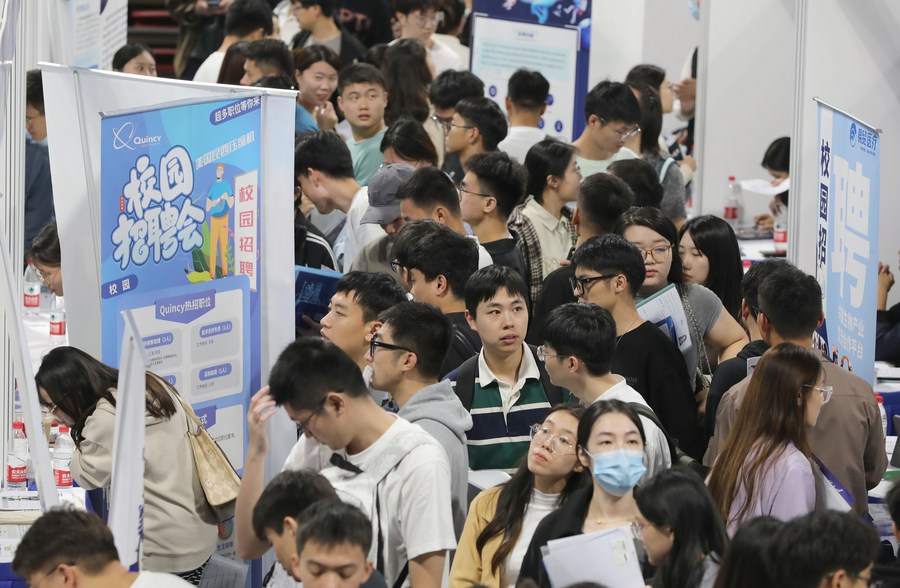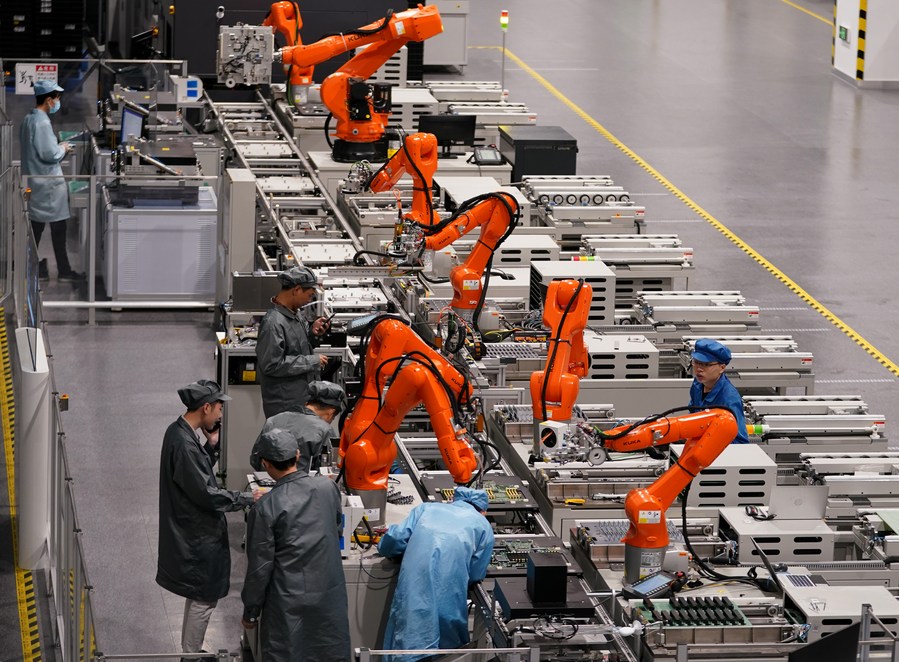Reasons why more young Chinese graduates opt for manufacturing jobs
* Entering manufacturing was once seen by many as taking up blue-collar work, which was hardly a preferred choice for college graduates.
* At the end of April 2023, AIGC, intelligent manufacturing and large-scale AI model were the three most popular sectors in terms of the number of job applications received from the graduates.
* Despite the high enthusiasm of college graduates for manufacturing jobs, some enterprises still find it difficult to find employees equipped with the right expertise to meet corporate needs in intelligent and digital development.
BEIJING, Nov. 15 (Xinhua) -- Chinese college graduates have shown greater willingness to work in the manufacturing industry, with emerging and high-tech sectors particularly favored.
Data from Chinese job-seeking website Liepin showed that at the end of April 2023, AIGC (artificial intelligence generated content), intelligent manufacturing and large-scale AI model were the three most popular sectors in terms of the number of job applications received from the graduates.
Year-on-year growth in the number of job applications in the three sectors hit 303.12 percent, 297.27 percent and 235.25 percent, respectively.
Another survey by Liepin showed that the proportion of applications from the upcoming graduates submitted to the internet and real estate industries decreased from 28.92 percent and 12.86 percent in 2021 to 19.39 percent and 7.85 percent in 2023, respectively.
The ratio concerning the machinery manufacturing sector increased from 4.47 percent in 2021 to 9.14 percent in 2023, a remarkable rise among surveyed industries.

College graduates are seen at a job fair in Shanghai University of Engineering Science in east China's Shanghai, Oct. 16, 2023. (Xinhua/Liu Ying)
INCREASING APPEAL
Sun Piwu, head of the organization department of the Party Committee of Shaanxi Automobile Group Co., Ltd., was impressed by college students' greater willingness to work in the manufacturing industry.
"The number of applications we received increased markedly in 2023 to exceed 10,000," Sun said.
Sun attributed the shift to college students adapting to changes in the job market as well as the growing appeal of high-end manufacturing.
Previously, entering manufacturing was seen by many as taking up blue-collar work, which was hardly a preferred choice for college graduates.
Nowadays, jobs in advanced manufacturing and strategic emerging industries, especially leading businesses in sectors of new energy, integrated circuits, and industrial automation, are much sought after, said Liepin vice president Ba Ran.
Rather than traditional manufacturing jobs, young Chinese college graduates are mostly drawn by posts related to the construction, management, operation and maintenance of digital workshops and intelligent factories, Ba said.
At Shanghai's largest autumn job fair for graduates on Oct. 25, nearly half of the 1,325 recruiters were high-tech enterprises, which received 25,000 job applications.
"I prefer offers from promising industries and sci-tech innovation enterprises which have more potential and offer good salaries as well," said a postgraduate student surnamed Yuan, who majors in energy and materials at Shanghai Polytechnic University.

A worker is busy at a workshop of Chongqing Hongjiang Machinery Co., Ltd. in Yongchuan District of southwest China's Chongqing, Oct. 11, 2023. (Xinhua/Wang Quanchao)
GROWING DEMAND
Li Zhiqiang, who entered a new energy car company last year after graduating from Hefei University, said he saw his department in the company rapidly expanding from dozens of people to more than 100 within a year.
In the photovoltaic industry, another popular employment destination, demand for talent is also growing.
Ma Fuhai, deputy general manager of the human resources department of LONGi Green Energy Technology Co., Ltd., a leading enterprise, said the company's business has continued to grow rapidly, and the demand for new talent, especially engineers, was increasing.
In 2023, more than 9,000 graduates were recruited on campus by LONGi, a 50 percent increase compared with 2022, Ma said.
Liepin data also showed that advanced manufacturing jobs pay better, with the average annual salary of jobs in intelligent manufacturing, AIGC, and large-scale AI model standing at 330,200 yuan (about 46,020 U.S. dollars), 303,600 yuan, and 279,900 yuan, respectively.

Technical workers work on a production line at a future factory of Unisplendour Corporation Limited (UNIS) in Xiaoshan District of Hangzhou, east China's Zhejiang Province, April 27, 2023. (Xinhua/Han Chuanhao)
TALENT SHORTAGE
Despite the high enthusiasm of college graduates, some manufacturing enterprises still find it difficult to find employees equipped with the right expertise to meet corporate needs in intelligent and digital development.
Companies said there is a mismatch between the needs of enterprises and the knowledge structure and technical cognition of applicants. Multidisciplinary and crossdisciplinary talent are in short supply.
According to a research report on industry talent, the overall shortfall of digital talent in China is about 25 million to 30 million.
"We are accelerating the training of digital technology engineers, focusing on smart manufacturing, big data, blockchain, integrated circuits and other related new occupations," said Li Jinsheng, an official with the Ministry of Human Resources and Social Security.
Photos
Related Stories
- Number of listed companies in high-end manufacturing sector tops 2,000 in China
- China's employment figures stable, 10.22 mln new urban jobs added in Jan.-Sept.
- China's employment stays stable, 10.22 mln new urban jobs added in January-September
- Job-hopping vlogger clocks 6 mln followers by trying 30 jobs in 6 months
- Job fair in Guizhou provides opportunities to college graduates
Copyright © 2023 People's Daily Online. All Rights Reserved.









